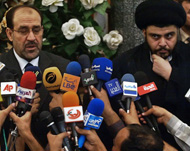Grim month for US in Iraq
The US military has reported the deaths of 10 soldiers in Iraq, raising to 68 the number of US troops killed in Iraq this month, while the Iraqi prime minister has held meetings with two influential Shia figures in an effort to build political consensus.

If the death death toll for US troops in Iraq continues to rise at the present rate, it will make this October the deadliest month for US-led forces in Iraq since January 2005.
Roadside bombs and enemy fire killed nine US soldiers in action in and around Baghdad on Tuesday, the military reported on Wednesday.
Four soldiers died when a roadside bomb struck their vehicle at about 6.50am (0350 GMT) on Tuesday morning, the military said in a brief statement.
Three soldiers attached to the 4th Infantry Division were also killed and one wounded during combat in Diyala province east of Baghdad, the military said.
Two more soldiers died in separate incidents – one when his patrol was hit by small-arms fire in northern Baghdad on Tuesday morning and another in a roadside bombing, officials said.
A marine wounded in fighting in Anbar province also died from injuries on Tuesday, the military said.
Al-Maliki meetings
Against this backdrop of rising US and Iraqi fatalities, Nuri al-Maliki, Iraq’s prime minister, on Wednesday consulted Grand Ayatollah Ali al-Sistani, Iraq’s top Shia cleric, and the Shia leader Moqtada al-Sadr in a bid to enlist support for his government’s efforts to build political consensus and tackle widening sectarian violence.
 |
|
On Wednesday, Al-Maliki met the |
“I came [to see al-Sistani] so that the security and political situation can be stabilised, allowing the government to turn its attention to reconstruction,” al-Maliki said after his meeting with al-Sistani in the city of Najaf.
Al-Maliki, whose more than four months in office have seen a marked deterioration in security, also sought to project the independence of his government from perceived US influence.
“The Iraqi government is a government of national unity that came to power through the will of the Iraqi people,” he said, adding that the “Iraqi people are the only authorised party that can remove this government or allow it to continue”.
Dialogue rejected
Meanwhile, in the Jordanian capital, Amman, Tariq al-Hashimi, the Iraqi vice president, said a dialogue with Iraqi resistance factions, which was suspended a few months ago, would be shortly resumed.
Speaking at a joint media conference on Wednesday with Marouf al-Bakhit, Jordan’s prime minister, al-Hashimi called on the Iraqi resistance factions to change their strategy, and begin negotiations either with the Iraqi or the US military.
In swift response, however, the Revolution of the 1920 Brigades, the armed wing of the Islamic resistance movement in Iraq, demanded that al-Hashimi take back his statement.
Earlier, Aljazeera reported that the senior Iraqi official’s visit was aimed at winning over tribal chiefs of Anbar province against a backdrop of opposition voiced by the US administration and Saudi Arabia to the idea of Iraq’s division along sectarian lines
Mounting criticism
In related news, Hoshyar Zebari, the Iraqi foreign minister, on Wednesday blamed American officials who ran Iraq before its own government took nominal control for bringing the country to the present state of chaos.
“Had our friends listened to us, we would not be where we are today,” Zebari said.
Asked which friends he was referring to, Zebari said: “The Americans, the Coalition [Provision Authority], the British. OK? Because they didn’t listen to us.“
“They did exactly what they wanted to do. Had they listened to us, we would have been someplace else [by now], really.”
Amnesty debate
Also on Wednesday, a report in Britain‘s Financial Times has said the White House is now pressuring Iraqi authorities to give amnesty to Sunni Muslim fighters.
So far the Bush administration has resisted amnesty because it could potentially include fighters who have killed American soldiers but have yet to be caught.
At the State Department, spokesman Tom Casey said a decision on amnesty would be left to the Iraqi government.
He said: “I wouldn’t describe our position as pressuring them to do this now or at any particular moment except at a point when they feel their national reconciliation process has gone through its appropriate steps and they’re ready to move forward with it.”